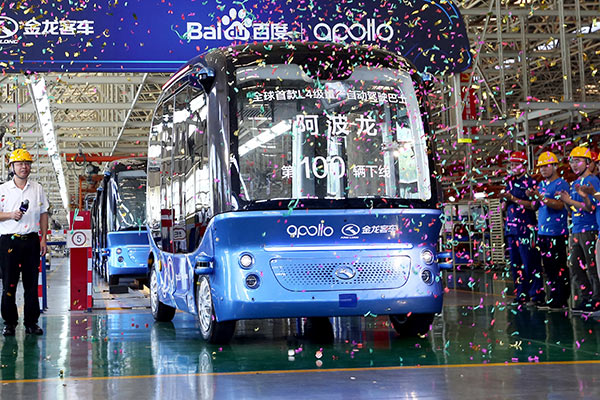Baidu’s self-driving bus begins mass production

Chinese tech giant Baidu announced that its newly developed self-driving bus would begin mass production as the 100th bus came off the production line Wednesday in southeast China’s Fujian Province.
The self-driving bus, named Apolong, was co-developed by Baidu and commercial vehicle manufacturer King Long.
The bus, which lacks a steering wheel, driver’s seat and brake, is instead equipped with a Baidu Apollo autonomous driving system, which is able to perceive its surroundings, predict the movements of vehicles and pedestrians, and plan optimized routes based on high-definition maps and intelligent sensing capability, according to Chen Weixiang, vice CTO of King Long.
Trials of the bus have been carried out in Fujian and Chongqing Municipality.
Initially, the bus will be used in semi-enclosed and enclosed areas, such as scenic areas, industrial parks and airports, with a limited speed between 20 and 40 km per hour.
The buses will be put into demonstration operations in Beijing, Xiongan, Pingtan, Guangzhou, Shenzhen and other Chinese cities. They are also expected to be exported to Japan in the near future.

A total of 30 self-driving vehicles carrying passengers have made test runs on Wednesday in the city of Cangzhou, North China’s Hebei province.
The vehicles, equipped with Baidu Apollo autonomous driving systems, ran on the test roads with a total length of up to 114 km in the Cangzhou Economic and Development Zone.
Chinese Internet giant Baidu unveiled the Apollo 3.0, the latest iteration of its Apollo autonomous driving platform at the Baidu Create 2018 on July 4, which involves four mass-produced solutions for developers to speed up self-driving vehicles’ scale production, namely, the DuerOS for Apollo, the valet parking, the unmanned microcar for delivery and the unmanned shuttle.
Prior to Apollo 3.0’s debut, Baidu has unveiled the Apollo 1.0, 1.5, 2.0 and 2.5 versions which have opened their entire units of competency, including the cloud, software, hardware reference platform as well as vehicle reference platform.
Baidu is preparing to launch a driverless service in China — and elsewhere — with another update to its Apollo autonomous driving platform and the mass production of Apolong, an autonomous mini bus that seats up to 14 people.